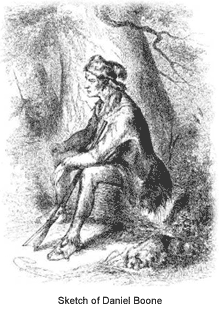Daniel Boone was born November 2, 1734, near Reading, Pennsylvania, to Quaker parents of English descent. Around 1750, the family moved to the Yadkin Valley in present-day North Carolina. In the new environment, Daniel Boone rapidly developed his skills as a hunter and trapper.
 During the French and Indian War, Daniel Boone served in Braddock’s disastrous campaign against Fort Duquesne. Following the war, Boone considered settling in Florida, but was unable to persuade his wife to make the move.
During the French and Indian War, Daniel Boone served in Braddock’s disastrous campaign against Fort Duquesne. Following the war, Boone considered settling in Florida, but was unable to persuade his wife to make the move.
In 1769, Boone began a two-year exploration of eastern Kentucky. His party crossed through the Cumberland Gap and proceeded as far as the Ohio River falls (present day Louisville). In 1773, an initial attempt to settle in the region was thwarted by Indian resistance.
In 1775, Daniel Boone was selected to be the agent for the Transylvania Company, a group of Carolinian land speculators. His men cleared a path into Kentucky that was known later as the Wilderness Road. A stockade was erected at Boonesborough near the Kentucky River. Boone later brought his family to the new settlement.
During the War of Independence, the small community of Boonesborough lay under constant attack from Indian allies of the British. Daniel Boone, a captain in the local militia, led the defense. In 1778, he was captured by Shawnee warriors and taken to the British headquarters in Detroit. After four months in captivity, he escaped and returned to resume protecting his home from the continuing assaults. Bogus charges of disloyalty were hurled at Boone by his rivals. He was quickly acquitted, but his feelings for the settlement had soured, and he left for North Carolina.
Daniel Boone returned to the Kentucky area (then part of Virginia) in 1779 and founded Boone’s Station near present-day Athens. In 1788, he moved to Point Pleasant (today in West Virginia) where he remained, uncharacteristically, for 10 years. He served several terms in the Virginia legislature, but lost most of his land holdings from a variety of title disputes.
In 1799, a dispirited Boone traveled down the Ohio River by canoe to St. Louis. The Missouri Territory at that time was a Spanish possession. He was granted a large land tract and became a public official. The Louisiana Purchase in 1803 ended his success: Ownership of Missouri was transferred to the United States, and many land titles were challenged -- including Boone’s. For the second time in his life, he lost most of his holdings and became deeply indebted. However, an act of Congress in 1814 restored a portion of his lands.
Daniel Boone became a widely known figure through the efforts of two very different writers. John Filson, a land speculator in Kentucky, featured Boone’s exploits in Discovery, Settlement and Present State of Kentucke (1784), as a marketing tool for western lands. And Lord Byron, the great English romantic poet, devoted seven stanzas to the frontiersman in his Don Juan (1821).
Many of Boone’s legendary feats have been called into question by historians, but he made a bona fide contribution through his exploration and settlement of Kentucky.
Daniel Boone died on September 26, 1820 at the age of 85.